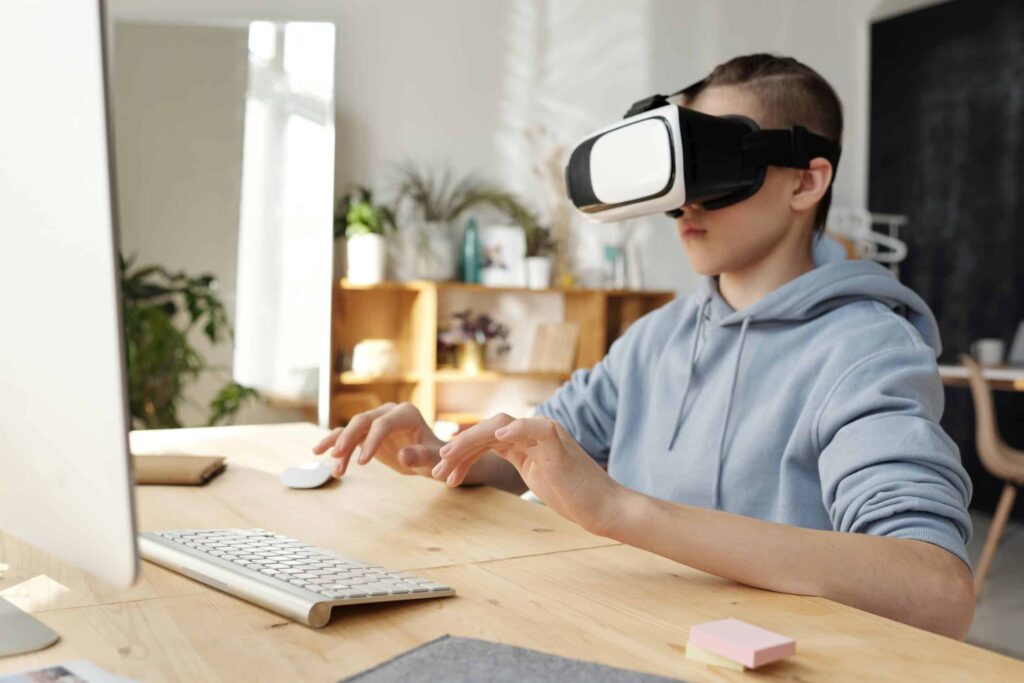We were all following the same traditional learning Pattern.
People used to compete before Virtual Reality as well.
So, why do my children require Virtual Reality?
If you are also pondering upon such thoughts, believe me, this post is for you.
In 2018, the Virtual Reality Market size was estimated at $656.6million, and it was predicted to grow at a CAGR of 42.9%, i.e., 13,098.2 million, by the year 2026. There is no surprise that it will touch the $ 10.37billion mark in 2022.
Let me assure you that this is not a passing fad but rather the educational future. The benefits of virtual reality in education will astound you.
Before going to the benefits, let’s understand how it works.
How VR works in education
Virtual reality is an excellent tool for providing students with a new viewpoint and real-life experience of the subject they are studying without physically being there.
Virtual reality can be utilized to improve student engagement and learning.
Envision your experience if you talk about extinct dinosaurs and see them and learn about their lives.
VR education has the potential to revolutionize the way educational content is provided. It works by generating a virtual world — real or abstract — and allowing users to see and interact with it. Immersion in what you’re learning encourages you to comprehend it fully. Processing information will demand less cognitive burden, which will improve cognitive abilities.

Benefits of Virtual Reality in education
Virtual reality education brings students closer to reality and closes the virtual and real-world gap. Here are some of the incorporations that show the benefits of virtual reality in Education.
Power of Visualization
Virtual reality provides pupils with spectacular 3D graphics, allows them to explore many truths, and tests their perception. Presenting 3D graphics and models in a traditional classroom context is difficult. It is scientifically proved that our brains process visuals faster than words and that pictures help us understand information better. Virtual reality instruction facilitates visual learning, which allows learners to grasp complex topics more quickly and easily.
Experiential Learning
Instead of experiencing topics, students in traditional education depend on reading to absorb them. A proven learning method is that a student learns faster when doing it independently rather than keep reading.
When students participate in experiential learning, they better comprehend the material and retain it for more extended periods. Virtual reality teaching encourages students to engage in hands-on learning and provides a safe place to practice. Virtual reality eliminates the risks of traditional teaching methods by providing a safe environment where learners can practice and learn from their mistakes without fear of repercussions. This is undoubtedly one of the great benefits of Virtual Reality in education.
High Engagement
“Lack of Focus” is one of the most common problems that all students confront. On the other hand, if they allow people to use Internet-equipped cell- phones, they will not put the mobile phones down even after 24 hours. You can thank its captivating characteristic for that. Because they were raised in a technologically advanced society, new generation students are more familiar and comfortable with technology, and they will embrace cutting-edge technologies like virtual reality in the classroom. Students will be more engrossed in a VR-powered classroom than in a traditional classroom.
Gamification
Virtual reality includes interactive gaming components into the learning process. As part of the gamified experience, students can try new things, fail, and learn from their failures. Students are more likely to participate actively in classroom activities when challenges and reward points are included in the curriculum. Adding a competition element and the chance to be the first to complete a challenge can make learning more enjoyable.
Stimulates Curiosity and Creativity
Virtual reality technology can produce compelling simulations and allow users to explore a realistic virtual world, encouraging young people to be more creative. Allow me to transport you back to your school days, when you could not solve a fundamental math issue despite numerous attempts, resulting in frustration and a loss of interest in the subject. On the contrary, once a person grasps the subject, it prompts fresh inquiries. This encourages the generation of new questions and their answers.
Surmount language obstacles
This is also one of unique benefit of Virtual Reality in Education. When English becomes accepted as an international language, many people prefer to communicate in their mother tongue. Students who wish to study in another country are usually required to know and speak the native language of that country and place. For some students, this may be a substantial barrier to overcome, and it may be the deciding factor in their decision to pursue an education abroad. However, VR-based instruction can overcome the language barrier because the software supports different languages.
These are only a few of the many stars found in the virtual reality sky. It can not only motivate people to innovate and produce better solutions to build a better future, but it can also enable them to stand out from the crowd. Undoubtedly, virtual reality for higher education will change the knowledge transfer experience. So, take advantage of VR’s potential to provide a better educational experience.

It’s natural to be curious about this magical technology after knowing about the benefits of Virtual Reality in Education. We can assist you if you want to use Virtual Reality to revamp your present teaching. IXR Labs is a virtual reality learning platform that allows instructors to design custom course content, track student progress, and boost student engagement. IXR Labs is your most excellent option for making education fascinating, fun, and immersive, with access to an ever-growing material library and tools to teach complex subjects.
